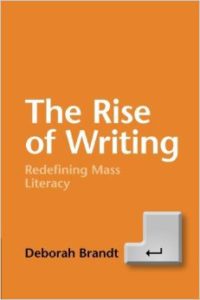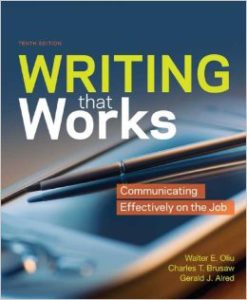In a job market where most job descriptions contain the phrase “strong writing skills,” what does it mean to be a good professional writer? This spring’s MA in WRD course, WRD 522: Writing in the Professions, will explore a variety of professional genres while also problematizing the concept of professional writing.
The class is the first-ever online course offered by the MA in WRD program. Instead of weekly class sessions on campus, the course will include weekly writing deadlines, Google Hangouts and discussion forums to discuss readings, and online peer review. Most importantly, Professor Lisa Dush hopes that the online format of the class will give students more time to write.
According to Dush, the course has two primary goals. The first goal is to learn and practice the conventions commonly associated with professional writing, such as audience-aware content and structure, brevity, frontloading, visual organization, and plain style. Students will write memos, proposals, and reports, using the textbook Writing That Works as a guide.
The second course goal is to think critically about professional writing. Students will read classic workplace and professional writing research, along with Deborah Brandt’s The Rise of Writing, which links the rising importance of writing in the professions with the more widespread emergence of ‘mass writing’ in American culture. Dush explains that these readings will prompt students to consider questions such as:
- How much and what sorts of writing happens in today’s workplaces and professions?
- How do writing norms and expectations differ across professions? Is there any such thing as a standardized form of good professional writing?
- How are the cultures and values of organizations and professions reflected in and constituted by the genres they use?
- How do individuals learn to write in their chosen professions? What pressures can writing in professional genres and in workplace settings put on individual writers?
These considerations will also inform the course’s final project. Students will use a common set of interview questions to each interview two workers who write in their professional lives. These interviews will be aggregated into a data set for students to use in their final project, in which they will investigate a research question of their choice using the class interview data, summarizing their findings in a professional report or academic paper.
While it fulfills requirements for the Professional and Technical writing concentration of the MA in WRD, Dush believes that this course could be “completely applicable to anyone who works” because workplace genres are no longer the sole domain of professionals with ‘writer’ in their title. Through class discussion, readings, interviews, and writing, students will consider the flexible and critical set of skills required to successfully write in today’s workplaces and professions.


